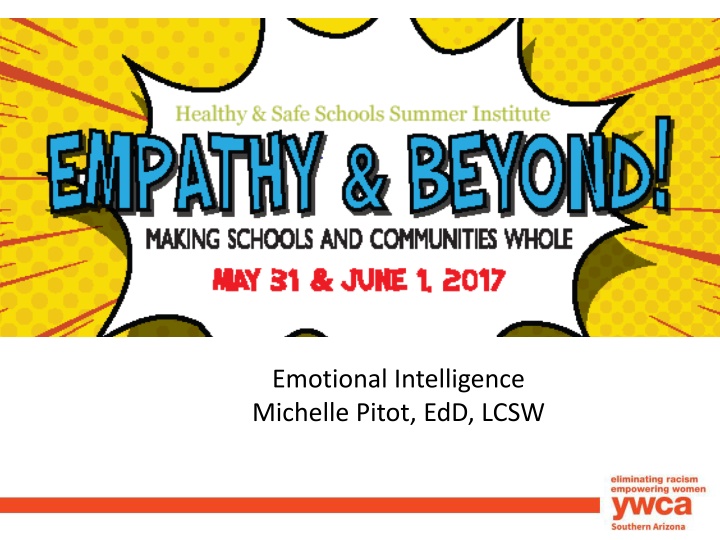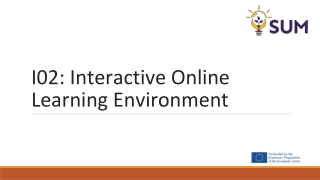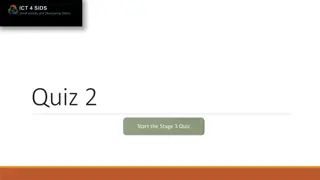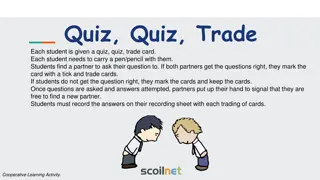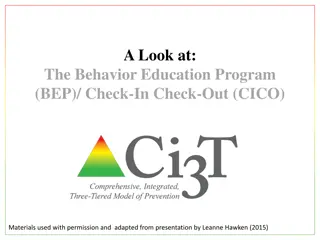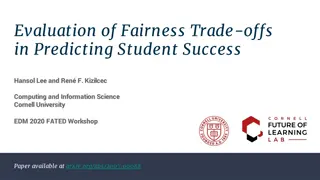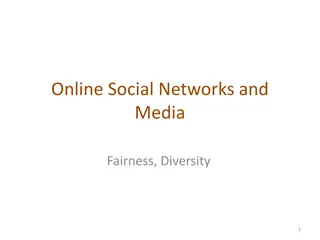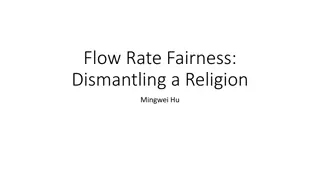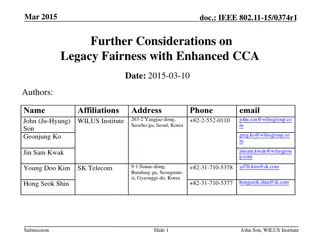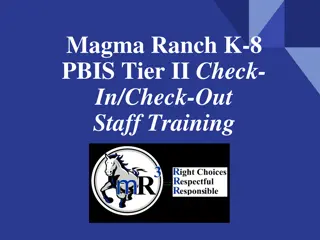Interactive Learning Check Quiz on Perceptions of Fairness
Dive into an interactive quiz focusing on students' perceptions of fairness related to grade outcomes. Explore dimensions of social psychology theories and the influence of sociodemographic factors on fairness perceptions. Test your knowledge on transparency of feedback and procedural justice. Engage with thought-provoking questions to enhance your understanding of fairness in educational settings.
Download Presentation

Please find below an Image/Link to download the presentation.
The content on the website is provided AS IS for your information and personal use only. It may not be sold, licensed, or shared on other websites without obtaining consent from the author.If you encounter any issues during the download, it is possible that the publisher has removed the file from their server.
You are allowed to download the files provided on this website for personal or commercial use, subject to the condition that they are used lawfully. All files are the property of their respective owners.
The content on the website is provided AS IS for your information and personal use only. It may not be sold, licensed, or shared on other websites without obtaining consent from the author.
E N D
Presentation Transcript
Emotional Intelligence Michelle Pitot, EdD, LCSW
On the planet Earth, man had always assumed that he was more intelligent than dolphins because he had achieved so much the wheel, New York, wars and so on whilst all the dolphins had ever done was muck about in the water having a good time. But conversely, the dolphins had always believed that they were far more intelligent than man for precisely the same reasons.
Objectives Definitions Aspects of EQ So what? All learning has an emotional base. ~Plato YWCA of Southern Arizona
What is Emotional Intelligence? The capacity for recognizing our own feelings and those of others, for motivating ourselves, for managing emotions and to use this information to guide one s thinking and actions. Goleman, 1995 YWCA of Southern Arizona
What do we know about EQ? YWCA of Southern Arizona
What is Emotional What is Emotional Intelligence all about? Intelligence all about? Personal Competence Social Competence Self-Awareness Knowing one s internal states, preferences, resources, and intuitions Social Awareness Awareness of others feelings, needs or concerns Aware- ness Relationship Management Adeptness at inducing desirable responses in others Self-Management Managing one s internal states, impulses, and resources Action
Emotional Competence Framework Personal Competence Social Competence Self-Awareness Knowing one s internal states, preferences, resources, and intuitions Aware- ness Actions
Emotional Competence Framework Personal Competence Social Competence Self-Awareness Knowing one s internal states, preferences, resources, and intuitions Aware- ness Self-Management Emotional Self-Control Identify and Choose Actions
Self-Management You and your partner have gotten into an argument that has You and your partner have gotten into an argument that has escalated into a shouting match; you re both upset and, in the heat escalated into a shouting match; you re both upset and, in the heat of the anger, you start to make personal attacks you don t really of the anger, you start to make personal attacks you don t really mean. What s the best thing to do? mean. What s the best thing to do? a. Take a 20 minute break and then continue the discussion Stop the argument and go silent Say you re sorry and ask your partner to apologise too Stop for a moment, collect your thoughts, then state your case as precisely as you can b. c. d.
Emotional Competence Framework Personal Competence Social Competence Self-Awareness Knowing one s internal states, preferences, resources, and intuitions Aware- ness Social Awareness Empathy Organizational Awareness Service Orientation Actions Self-Management Emotional Self-Control Identify and Choose
Social Awareness Social Awareness Awareness of others feelings, needs or concerns Empathy (mandatory) Sensing others feelings and perspectives, and taking an active interest in their concerns Organizational Awareness Reading a group s emotional currents and power relationships Service Orientation Anticipating, recognizing, and meeting customers needs
Emotional Competence Framework Personal Competence Social Competence Self-Awareness Knowing one s internal states, preferences, resources, and intuitions Social Awareness Aware- ness Empathy Organizational Awareness Service Orientation Relationship Management Self-Management Emotional Self-Control Identify and Choose Actions Influence Developing Others Inspirational Leadership Change Catalyst Conflict Management Teamwork & Collaboration
Relationship Management Relationship Management Relationship Management Adeptness at inducing desirable responses in others Conscious Influence (mandatory) Having intentional impact on others Developing Others Sensing others development needs and bolstering their abilities Inspirational Leadership Inspiring and guiding individuals and groups Change Catalyst Initiating or managing change Conflict Management Negotiating and resolving disagreements Teamwork & Collaboration Working with others towards shared goals YWCA of Southern Arizona
How Do I Raise My EQ? How Do I Raise My EQ? 1. Rapidly reduce stress/ intense emotion in the moment 2. Beat relationship stress with emotional awareness 3. Increase attention to nonverbal communication 4. Use humor and play to deal with challenges 5. Handle change positively 6. Cultivate creativity and energy YWCA of Southern Arizona
Why EI in the Classroom? Emotions and feelings of inadequacy tend to be stronger when students learn brand new concepts. Teachers can help by creating a learning environment that promotes emotional security. Intelligent use of one s emotions Teachers set the emotional tone of the classroom Based on brain research: passion, motivation, commitment Encourages motivation to develop one s abilities by celebrating one s strengths rather than focusing on weaknesses Provides an intrinsic motivation to learn
How Can Educators Use Emotional Intelligence? Pay attention to self and others body language, group Pay attention to self and others body language, group energy energy Listen more; speak less Listen more; speak less - - develops empathy Get curious, not furious Get curious, not furious - - Watch what you say especially when frustrated or annoyed. Reframe: Negative emotions can be displaced by asking questions. Elicit pride in others Elicit pride in others Reason for working together Remember that emotions are contagious Remember that emotions are contagious - - A person's emotions (negative or positive) always influence others.
What educators can do to stimulate EI skills in their students Clear communication Healthy boundaries Self awareness Sharing resources, knowledge, support Patience Listening Asking questions Honoring differences Gentleness Self-motivation Self-control
Group Discussions What approaches do you/can you use to build a safe and caring learning environment? What instructional strategies do you/can you use to improve students ability to express emotions appropriately? Make responsible decisions? Solve problems effectively? How can you integrate social-emotional learning with traditional academics to enhance learning?
So long and thanks for all the fish! Michelle Pitot mpitot@ywcatucson.org www.ywcatucson.org
